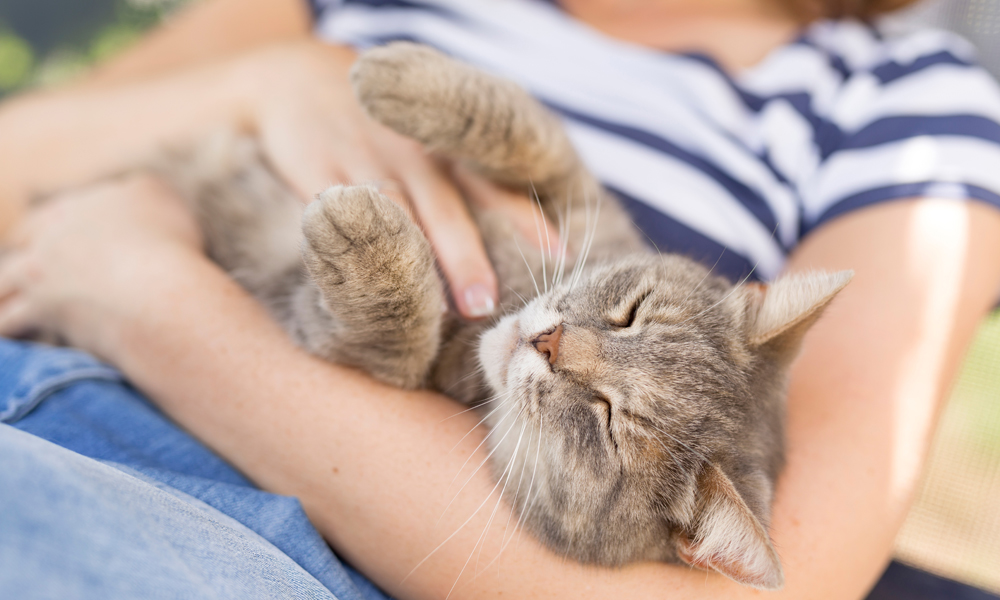Cats can be mysterious creatures, and according to the Washington Post, they’re one of the world’s most popular pets. Some say it’s because cats are self-reliant, low maintenance and still display affection.
However, some owners don’t see their cat as affectionate for the sake of being affectionate, and believe their cat only acts cute and cuddly when they want something.
Like any mammal, cats are unique in their own right. While fluffy and fascinating, many are thought to be aloof, communicating their emotions and desires in ways others may not understand.
Cats express themselves differently than dogs
A lot of people gravitate toward dogs because they’re an open book. They wag their tail when they’re happy to see you, they lick your face to give you a kiss and their ears perk up with excitement when you call their name.
Cats, on the other hand, can have varying responses. Some cats like to be pet and cuddled while others prefer to be left alone. Some come to you when you call their name, others couldn’t care less. No matter your cat’s personality, their feelings and responses are always genuine no matter how they express them. In fact, many cats have a strong bond with their human owners, but the way they express their love and admiration may vary. Here are a few examples of feline affection you may not realize:
They bring you gifts
Those gifts could include a piece of garbage, their favorite toy or a dead animal.
It’s an ancestral trait cats have developed over many years. In the wild, mother cats would teach their young to bring back either dead or injured prey so they can teach their young how to eat. If your cat presents you with a dead mouse, frog or rat, they’re acting on their instincts. They do this because they know their catch will be safe and secure in your presence.
They knead on you with their paws
Kneading is when cats push and pull their front paws on a person or object they find comforting. At birth, nursing kittens are known to knead their mother for milk. Once they’re adults, many cats will use this kneading behavior to snuggle with their favorite humans. If your cat jumps up on you and kneads your stomach or lap, it means your cat sees you as a safe parental or authority figure and are at ease in your presence.
They turn their back to you
This behavior can seem counterintuitive. However, in the feline universe, turning your back to someone is a sign of mutual respect and unity. It means that your cat trusts you and knows you won’t do anything to harm them.
They show you their stomach
Cats are excellent predators, but that doesn’t mean they don’t have weak spots. For cats, their stomach is often their Achilles’ heel, as most of your feline’s vital organs are on the other side of their abdomen. If your cat feels safe around you, they might sprawl out on their back and show you their belly.
However, it’s important to note that you shouldn’t try to pet their stomach. Some cats like it, but others may find it upsetting. That’s because some hair follicles on a cat’s belly are very sensitive, so petting their stomach can feel overstimulating and uncomfortable for them.
They headbutt you
Unless you and your family are avid rugby players, headbutting another person can seem very unnatural. But for cats, a headbutt is a sign of love. When a cat does this, it’s telling you that you’re an ally and part of their pack.
Headbutting is also a way for cats to mark their territory. You may notice that your cat headbutts all of your stuff as well. Cats have scent glands on their chin, cheeks and forehead that they use to place their scent on both you and inanimate objects. If you had a new roommate or significant other move in recently, you’ve probably noticed that your cat is headbutting all of their possessions. It’s often their way of saying “I like you, but you smell bad.”
They follow you around
They say imitation is the greatest form of flattery. That’s especially true for cats. Your feline probably idolizes you and thinks you’re the greatest. Your cat may insist on watching you do the most mundane tasks, including brushing your teeth, eating breakfast or sitting by your desk while you work. Cats are very intelligent creatures and learn patterns and behaviors from their owners. Thus, following your routine and way of life is what helps them adapt to their natural surroundings.
They blink at you
There’s nothing more distinct than a feline gaze. Your cat may look like they’re staring intently and intensely. However, you can see your cat’s eyes blink from time to time. That’s a sign that they’re looking at you with affection and astonishment. Many say that a cat’s slow blinking is a sign of true feline love, also known as a “kitty kiss.”
If you have multiple cats in the house, you may see them blink quite regularly at each other. That’s their way of signaling to the other cats that everything is okay and that there’s nothing to worry about.
They gurgle regularly
This isn’t something that all cats do. However, if you notice that your cat makes a distinctive gurgling or chatting sound, you may be keeping them in good spirits. It’s often an indicator that they’re feeling cheerful, excited and friendly.
They groom you
Typically, you think of dogs licking their humans to display affection; some cats do this too. However, a cat lick is not the same as a kitty kiss. Cats have a sandpaper-like tongue that they use to groom themselves and sometimes other cats. When they lick you, this can indicate that they’re doing you a favor by cleaning you up a bit.
Feline love is always genuine love
You may find the way your cat displays affection to be strange. But no matter how you define it, there’s no stronger bond between a human and their furry feline friend. Now that you understand how your cat expresses its love for you, you can return the feeling, no matter their age, by giving them healthy and natural pet food.
[Related: Why your cat brings you dead mice]
At NutriSource, we offer a wide variety of wet and dry pet foods that provide an exclusive blend of supplements and grain-inclusive formulas that promote a healthy gut and a happy life. You can find our products at your local independent pet retailer.


